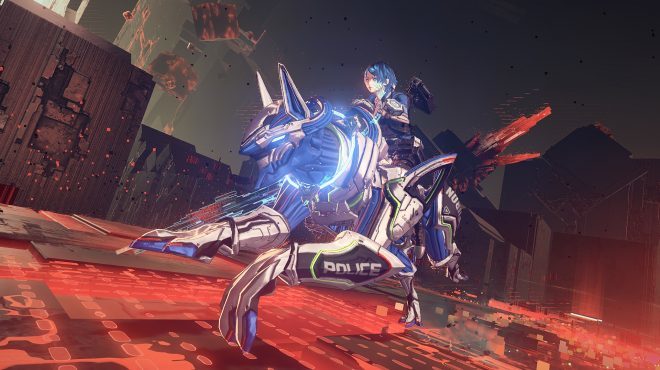
Astral Chain’s most immediate difference to most of Platinum Games’ previous works is just how heavy everything feels. It’s difficult to notice at first, especially through the high-intensity action that bursts at the seams with bright effects and immaculate animations.
The pace of Astral Chain is breathless, never ceasing to let up when you’re cutting down its Chimera enemies as they come at you in droves. But your actions have purpose. A swing of your baton, or the firing of your gun, lock you into your decisions and don’t easily let you forget your mistakes. Astral Chain’s combat is more thoughtful and complex than anything Platinum Games has done before, which helps make it one of their best original works in quite some time.
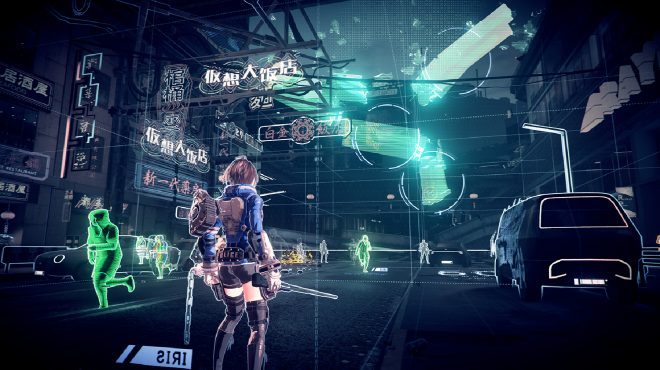
You start the game as one of two fraternal twins, relegating the other to the role of a sibling living in your shadow. After an exhilarating introduction, you’re both inducted into a special task unit known as Neuron – a select few police officers who have been granted the chance to command their own Legion in battle. What makes these Legions special is where they come from. Humanity has been brought to the brink of extinction by an invasion of deadly Chimera from an alternate dimension, resulting in these creatures paradoxically being the only solutions to the threat that they pose to mankind. By entrapping them and bending them to your will, you’ll turn your own enemy against itself, skillfully wielding multiple Legions at your side in battle.
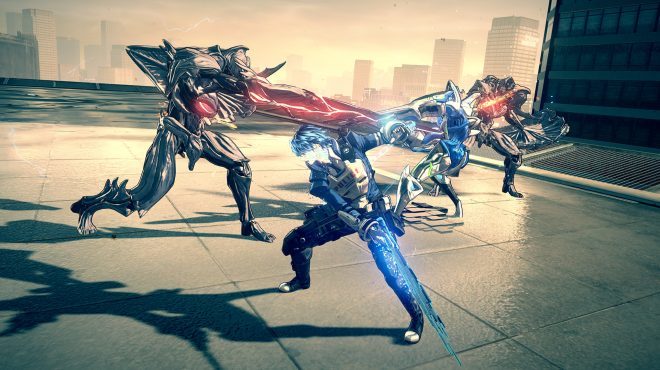
Your Legion is an integral part in understanding how Astral Chain conducts itself in the heat of battle. You aren’t just controlling your own character, equipped with a transforming weapon and a basic attack with each. Instead, you’re conducting the harmony between them and their equipped Legion. You throw out your Legion at will, who will then automatically attack enemies once they’re close enough to you with far more damage than you’re able to output. Their time in battle is governed by a meter that drains when your Legion takes damage, but is topped up as you land your own attacks and dodge others. Your Legion is a resource that you need to carefully manage throughout a battle, making sure they’re recalled before completely draining out and leaving you vulnerable for a long stretch of time.
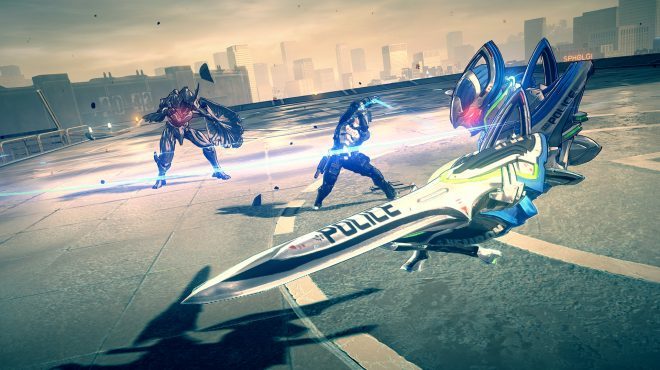
Legions aren’t entirely autonomous though. Connected by a glowing blue chain, your indelible link to your chosen partner forms a greater part of the flow of combat. Incoming attacks like powerful charges from hulking enemies can be entirely reversed if you catch them between your link and send them hurtling through the air, stunned and primed for a counter-attack. You can alternatively move your Legion around enemies too, wrapping them up in your chain and locking them down for a brief period while you unleash a flurry of successive attacks.
Chaining together attacks into a combo or dodging incoming ones with perfect timing (which also features a satisfying time slowdown afterwards) lets you and your Legion combine for powerful attacks. These are signified by just a single flash of light that you need to act upon quickly to execute, forcing you to always be aware of your current running combo. Combat can be a chaotic mess of visual effects and enemy units, but Astral Chain delicately designs its visual language to be understandable when it needs to be. Missing an attack with your Legion always feels down to you and not a misunderstanding of when you needed to act.
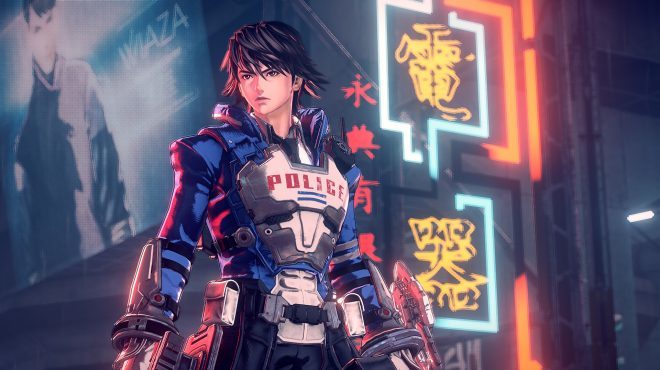
Each Legion also comes with its own set of attributes and attacks, each of which can be upgraded using their own individual skill trees. As you progress and unlock more Legions to play around with, learning when to swap them in battle becomes just as important as understanding their inherent abilities. Between swapping Legions, controlling them on the battlefield and engaging in your own close-quarters character action, Astral Chain can seem overwhelming at times, but each of these elements are introduced slowly enough for you to grasp each of them fully before being built upon, letting you not only get comfortable with where you are but feel proficient before a new layer is added on top.
What doesn’t help is the occasionally erratic camera which doesn’t keep up with your most intense fights, especially when you’re engaging with Astral Chain’s larger and more devastating foes. Locking onto enemies and switching between them is easy enough, but having a good angle on the position of your Legion and your own position is often too much to ask to keep track of. Things are exacerbated when using some of your Legion’s unique abilities. The Sword Legion, for example, features a slowed-down slicing ability akin to Metal Gear Rising: Revengeance which lets you line up your strike to interrupt enemy attacks or solve puzzles. Positioning the angle is tricky enough without the camera feeling sluggish and imprecise, making it difficult to pull out of your pocket in battle effectively.
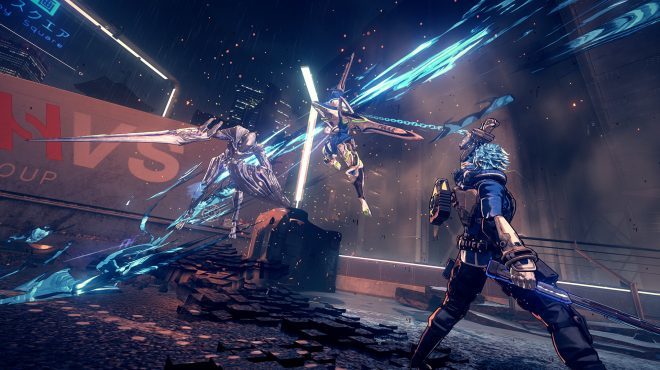
Unlike Bayonetta before it, Astral Chain borrows its pacing elements from Nier Automata. Although it doesn’t feature the same large world to explore, each of Astral Chain’s chapters, named Files, lets you explore a small hub world filled with more than just combat encounters. Each plays out as an escalating police case, where you’ll gather clues, interrogate civilians and eavesdrop on conversations. Your Legion is used here too, letting you listen to characters from afar, access areas with its ability to pull you towards its position and gather up corrupting red matter scattered across the streets from the dimension your enemies come from.
None of these actions are incredibly difficult. The cases themselves require little thought on your part to piece together but do manage to control the pace between each combat encounter nicely. It’s fun to find new areas by simply poking around each little hub with a sense of curiosity, and you’re rewarded with crafting items accordingly. As you expand your Legion set, you’ll gain access to even more areas which are unlocked by specific abilities, which might tempt you into revisiting past areas and hunting for spaces previously thought inaccessible. Eventually each case leads to a trip into the Astral Plane for more straight forward knock about with Chimeras, but the downtime between each is a captivating way to familiarise yourself with Astral Chain’s fractured but visually stunning world.
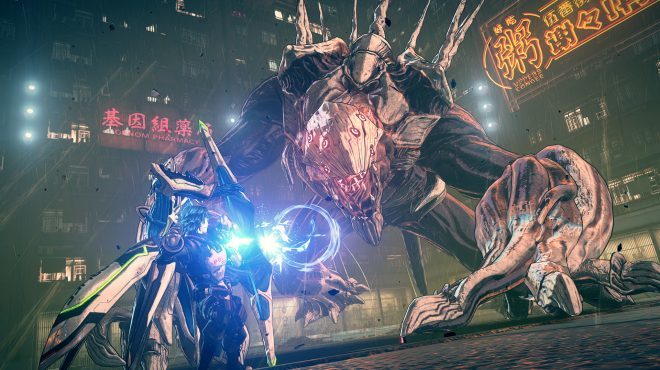
It’s one that doesn’t deliver on its visual promise though, especially with regards to the central plot of overcoming extinction. Although the pieces of an intriguing premise are beautifully positioned at the start, Astral Chain quickly devolves into predictable plotlines with unsurprising villains and familiar themes. Its characters aren’t that interesting for the most part either, with some even managing to become more infuriating as time goes on. Your character’s silence in dialogue only makes this worse, stripping them of any personality and instead transferring that over to the sibling you chose not to play as. Although there are slight glimmers of personality from some side characters, especially when it comes to comedic relief amongst an overbearing threat to humanity, it’s not enough to make the lengthy runtime feel like it encapsulates an enthralling tale.
It’s a shame that there isn’t more depth to Astral Chain’s world outside of its undeniable beauty, which you get to soak in during different times of the day that help illuminate its stunning views. With bold black outlines contrasting bright neon shading and colourful designs, Astral Chain crafts an identity of its own that difficult to mistake for anything else. It’s supplemented by a roaringly great soundtrack too, which combines infectiously catchy electric beats with high-tempo rhythms that make combat a blast and downtime suitably relaxing. Getting lost in the theme to the police station as you’re making your rounds for crafting and upgrades never felt like a chore, in a large part thanks to the soothing beat playing in the background.
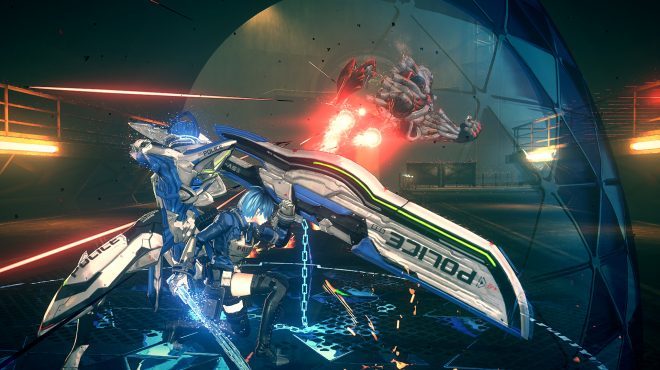
There’s a lot of attention paid to the broad strokes of Astral Chain that will occupy most of your time with it, and it’s the beats that Platinum Games are most known for. Its combat is complex and deep, feeling overwhelming at first but remaining incredibly satisfying to carve through and learn thoroughly. It’s a symphony of close-quarters combat and careful planning, making it a more thoughtful system than Platinum has designed before. Although its cases are less complex to master, they’re still good excuses to poke and prod around Astral Chain’s gorgeous world, even if their threads hardly lead to interesting conclusions. It’s a pity that Astral Chain doesn’t capitalise on a great premise with an engaging story, but everything else is Platinum firing on all cylinders and never letting you go for the ride-along.
Last Updated: August 27, 2019
| Astral Chain | |
|
Astral Chain is one of Platinum Games’ most complex and satisfying action games to date, with combat that’s suitably fast but far more purposeful and careful in execution. Its gorgeous world and enticing premise are betrayed by an uninteresting story and characters, but there’s little else to fault when you’re teaming up with your legions and solving cases across different dimensions.
|
|
|---|---|
| Astral Chain was reviewed on Nintendo Switch | |
|
87 /
100
| |





















Yahtzee
August 27, 2019 at 11:27
Oh my. Oh yes!